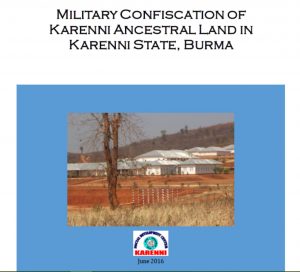New Report: Military Confiscation of Burmese Ancestral Land in Karenni State
By Karenni Social Development Center • June 30, 2016 This report is based on direct testimony provided through interviews with 40 villagers between February 16 and March 28, 2015. The villagers come from four villages in Karenni State: MarkrawShe, HsolyarKu, Daw HsoShay and Daw MuKlah. Interviews were conducted in the Karenni language and in the Burmese language by two graduates of the Karenni Social Development Center, researchers Aung and Myint,1 and later translated into Burmese and English by one of the researchers and foreign volunteers. All photographs that are used in this study were taken by the two researchers during the same period of time.
This report is based on direct testimony provided through interviews with 40 villagers between February 16 and March 28, 2015. The villagers come from four villages in Karenni State: MarkrawShe, HsolyarKu, Daw HsoShay and Daw MuKlah. Interviews were conducted in the Karenni language and in the Burmese language by two graduates of the Karenni Social Development Center, researchers Aung and Myint,1 and later translated into Burmese and English by one of the researchers and foreign volunteers. All photographs that are used in this study were taken by the two researchers during the same period of time.
The historical information about Karenni State is taken from a variety of secondary sources in order to provide a picture of the complex history of conflict in the region. At the time of writing Burma has recently transitioned to a new government. The outgoing government (led by President Thein Sein) was replaced by the National League for Democracy (NLD) government following elections in November 2015. President Htin Kyaw was sworn in as the new President at the end of March 2016.
Download the full report in English here.
Tags: Business and Human Rights, Economy, Environmental issue, Ethnic Minorities, Human Rights, Karenni Social Development Center, Land Confiscation, Military RegimeThis post is in: Business and Human Rights, Children and Youth, Crimes Against Humanity, Economy, Environmental and Economic Justice, Ethnic Nationalities, Health, Human Rights, Law
Related PostsKaren State September 2016 Conflict: The Real Motivations Behind Renewed War
Burma Army’s actions in Karen State threaten to expand fighting, endangering peace process and displaced people’s return
Ann Din Coal Power Plant: Local Movement and Action to Preserve and Protect Natural Resources and Land: Mon IDP Report Case Study #4
New film: Shan State’s unique “Thousand Islands” under threat from Salween dam plans
EU Must Continue UN General Assembly Resolution on Burma









 All posts
All posts